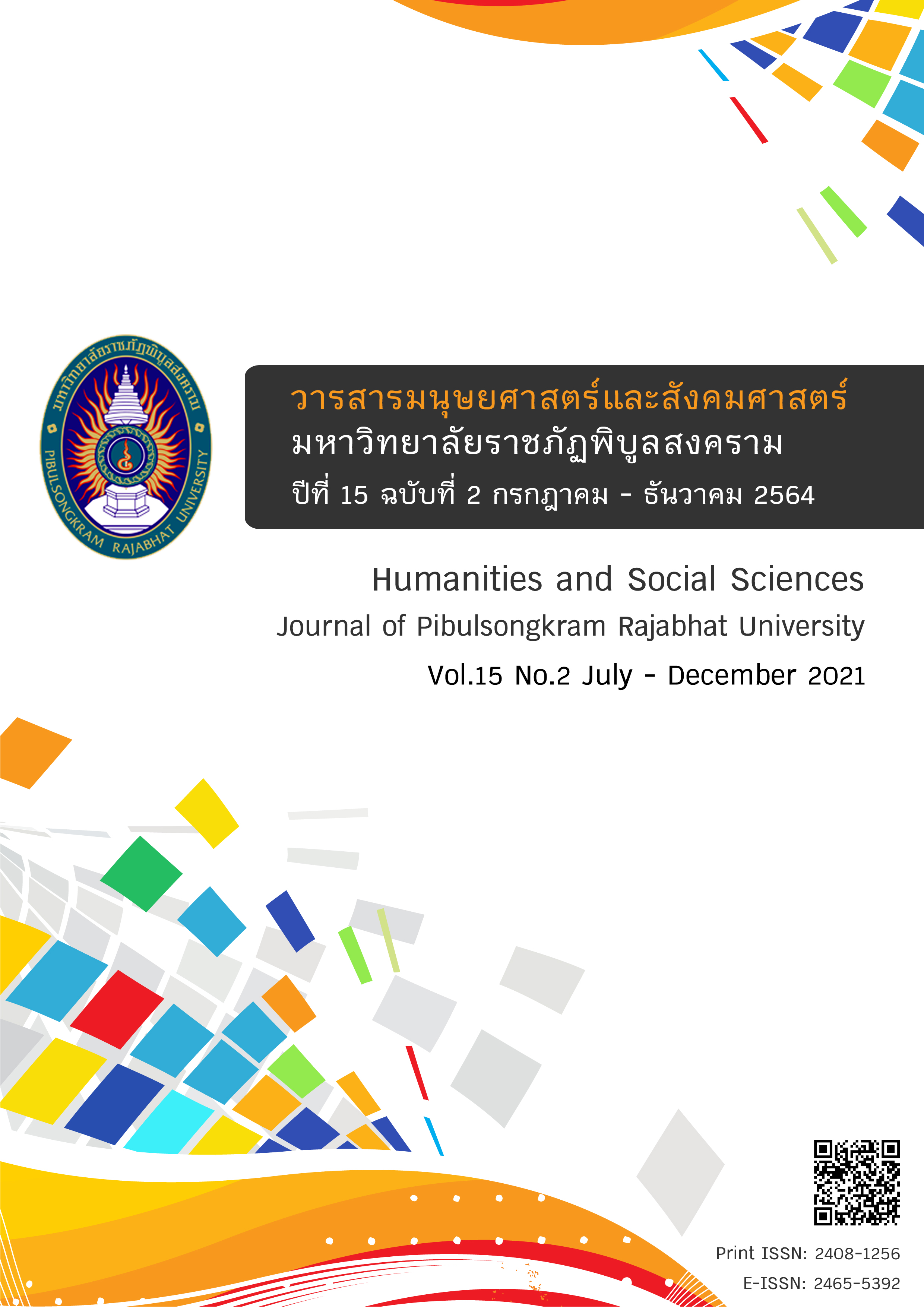A Study of Attitudes and Affecting factors for Purchasing Herbal Cosmetics in Undergraduate Group in Phitsanulok Province to Penetrate the New Customers Group
DOI:
https://doi.org/10.14456/psruhss.2021.37Keywords:
Herbal cosmetics, Logit mode, Decision makingAbstract
This research studied the attitudes and affecting factors for purchasing herbal cosmetics in undergraduate group in Phitsanulok province. Logit model was built and used to predict the decisions. We proposed guidelines for developing herbal cosmetic products in accordance with the needs of undergraduate group. The results, found that most of them like to buy cosmetics from department stores and convenience stores and spend 501-1,000 Baht per month to buy cosmetics, most students have used herbal cosmetics before. The most marketing mix factors that affected by their decision to buy herbal cosmetics is the factors of production, which must be the products with standard quality, safe and certified by relevant agencies. The results from logit model showed the most personal affecting factors were gender, experience of using herbal cosmetics and educational institutions respectively, And the most marketing mix factors that affect to the students' decision were the receipt number, brand, packaging and promotion, respectively. The Logit model can be used to predict the decision of herbal cosmetics purchasing for undergraduate group with correctly predicted values 77.65%.
References
จริยาวรรณ ขาวสุด. (2552). พฤติกรรมการตัดสินใจเลือกซื้อเครื่องสำอางของผู้บริโภคในห้างสรรพสินค้าฟิวเจอร์พาร์ค รังสิต จังหวัดปทุมธานี (วิทยานิพนธ์ปริญญามหาบัณฑิต). ปทุมธานี: มหาวิทยาลัยอีสเทิร์นเอเชีย.
จุฑามาศ เฟื่องโชติการ, ลัสดา ยาวิละ, และรัตนา สิทธิอ่วม. (2563). ส่วนประสมทางการตลาดที่มีอิทธิพลต่อกระบวนการตัดสินใจซื้อสินค้าบนสื่อออนไลน์เฟซบุ๊กของประชาชนในจังหวัดพิษณุโลก. วารสารมนุษยศาสตร์และสังคมศาสตร์ บัณฑิตวิทยาลัย มหาวิทยาลัยราชภัฏพิบูลสงคราม, 14(1), 212-228.
ณัฐกาญจน์ สุวรรณธารา. (2560). ศึกษาปัจจัยส่วนประสมทางการตลาดที่มีผลต่อความพึงพอใจในการเลือกซื้อเครื่องสำอางตราสินค้าไทยของผู้บริโภค ในเขตกรุงเทพมหานคร. วารสารวิชาการมหาวิทยาลัยธนบุรี, 11(25), 164-171.
พิมพร ลีลาพรพิสิฐ. (2547). เครื่องสำอางธรรมชาติ : ผลิตภัณฑ์สำหรับผิวหนัง (Natural cosmetics : products for skin). กรุงเทพฯ: โอเดียนสโตร์.
รัฐศักดิ์ พลสิงห์. (2553, 31 สิงหาคม). สมุนไพรไทยมีดีกว่าที่คิด. กสิกร, น. 24.
ศมพร เพ็งพิศ. (2552). ปัจจัยทางการตลาดที่มีความสัมพันธ์กับการตัดสินใจซื้อเครื่องสำอางสมุนไพรไทยในเขตกรุงเทพมหานคร (วิทยานิพนธ์ปริญญามหาบัณฑิต). นนทบุรี: มหาวิทยาลัยสุโขทัยธรรมาธิราช.
ศิริวรรณ เสรีรัตน์, ปริญ ลักษิตานนท์, ศุภร เสรีรัตน์, และองอาจ ปทะวานิช. (2541). การบริหารการตลาดยุคใหม่. กรุงเทพฯ: ธีระฟิล์ม และไซเท็กซ์.
สภาอุตสาหกรรมแห่งประเทศไทย. (2554). รายงานการวิเคราะห์ขีดความสามารถในการเข้าสู่ประชาคมเศรษฐกิจอาเซียน (AEC): กลุ่มอุตสาหกรรมสมุนไพร. กรุงเทพฯ: สภาอุตสาหกรรมแห่งประเทศไทย.
สำนักข่าวไทย. (2558). เครื่องสำอางไทยพร้อมลุยจีน-อาเซียน. สืบค้น 23 กันยายน 2561, จาก https://www.youtube.com/watch?v=rp4VnHIjVRM
สำนักงานคณะกรรมการพัฒนาการเศรษฐกิจและสังคมแห่งชาติ. (2550). แผนพัฒนาเศรษฐกิจและสังคมแห่งชาติ ฉบับที่ 10 (พ.ศ. 2550-2554). กรุงเทพฯ: วี.เจ. พริ้นติ้ง.
สำนักงานคณะกรรมการพัฒนาการเศรษฐกิจและสังคมแห่งชาติ. (2555). แผนพัฒนาเศรษฐกิจและสังคมแห่งชาติ ฉบับที่ 11 (พ.ศ. 2555-2559). กรุงเทพฯ: สำนักงานคณะกรรมการพัฒนาการเศรษฐกิจและสังคมแห่งชาติ.
สุพฤกษา ท่าสระ. (2552). พฤติกรรมและการตัดสินใจซื้อเครื่องสําอางสมุนไพรของประชาชนในจังหวัดพระนครศรีอยุธยา (วิทยานิพนธ์ปริญญามหาบัณฑิต). พระนครศรีอยุธยา: มหาวิทยาลัยราชภัฏพระนครศรีอยุธยา.
สุรีพร มิลิวงศ์. (2553). ปัจจัยที่มีอิทธิพลต่อการตัดสินใจซื้อผลิตภัณฑ์เครื่องสำอางสมุนไพร ของผู้บริโภคในเขตเทศบาลนครอุบลราชธานี (วิทยานิพนธ์ปริญญามหาบัณฑิต). อุบลราชธานี: มหาวิทยาลัยราชภัฏอุบลราชธานี.
อุษณีย์ เส็งพานิช. (2562). ส่วนประสมทางการตลาดที่มีผลต่อการตัดสินใจซื้อเครื่องสำอางสมุนไพรของผู้บริโภคในอำเภอเมือง จังหวัดพิษณุโลก. วารสารวิทยาการจัดการ มหาวิทยาลัยราชภัฏพิบูลสงคราม, 1(2), 103-117.
Aaker, D. A. (1991). Building strong brands. New York: Free press.
MGR Online. (2558). ทำไม? คนไทยไม่นิยมเครื่องสำอาง "สมุนไพรไทย". สืบค้น 23 กันยายน 2561, จาก https://mgronline.com/science/detail/9580000028819
Richards, S. L., & Ben-Akiva, M. (1985). Discrete Choice Analysis: Theory and Application to Travel Demand. Cambridge, MA: The MIT Press.
Downloads
Published
How to Cite
Issue
Section
License
Any articles or comments appearing in the Journal of Humanities and Social Sciences, Rajabhat Phibulsongkram University, are the intellectual property of the authors, and do not necessarily reflect the views of the editorial board. Published articles are copyrighted by the Journal of Humanities and Social Sciences, Rajabhat Phibulsongkram University.









